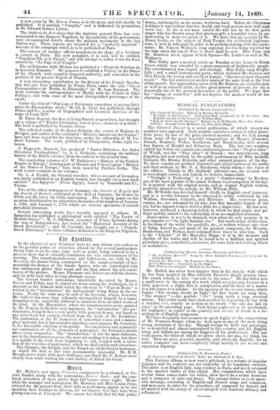Tlintrrs.
In the absence of new theatrical facts we may inform our readers as to the peculiar points of attraction offered by the several pantomimes. Drury Lane is on the same large scale as usual, being ushered in by a piece so short that it virtually constitutes the sole entertainment of the evening. The transformation-scene and ballet-scene are both by Mr. Beverley, the former being constructed on the simple principle of har- monizing the dresses of the female figures, who are surrounded with less extraneous glitter than usual, and are thus almost the sole consti- tuents of the picture. Messrs. Flexmore and Bolen° are still the clowns, and vie with each other in long alternate scenes. The Covent Garden pantomime, beautifully decorated by Messrs. Grieve and Telbin, may be almost set down among the burlesques, for it depends on the humour with which the old story of "Puss in Boots" is treated in the "introduction," the harlequinade being flimsy in the ex- treme. Nearly the same may be said of the Lyceum, where, however, Mr. Callcott has more than ordinarily distinguished himself by a trans- formation-scene essentially different in character from all other works of the kind. At the Haymarket, where the transformation-scene, painted by Mr. Fenton, is likewise very ingenious, the "introduction" also pre- dominates, being in fact a very pretty little pastoral drama, not based on any story-book but entirely evolved from the brain of Mr. Buckstone. The pantomime at the St. James's is of somewhat coarse and common- place material, but it has served to introduce a new painter, Mr. Coventry, to the favourable criticism of the public. In compactness and symmetri- cal combination of all the elements of pantomime, the Princess's stands above every competitor. The "introduction" is not the most elaborate, nor is the transformation-scene the most astounding in London, but there is a sparkle in the work from beginning to end, coupled with a reten- tion of the true idea of pantomime, which we shall vainly seek elsewhere. The Olympic, the Adelphi, and the Strand are all devoted to burlesque, in which the first is this year preeminently successful. Mr. R. B. Brough never wrote with more brilliancy, nor fitted Mr. F. Robson more closely than while writing his comic history of Alfred the Great.


























 Previous page
Previous page